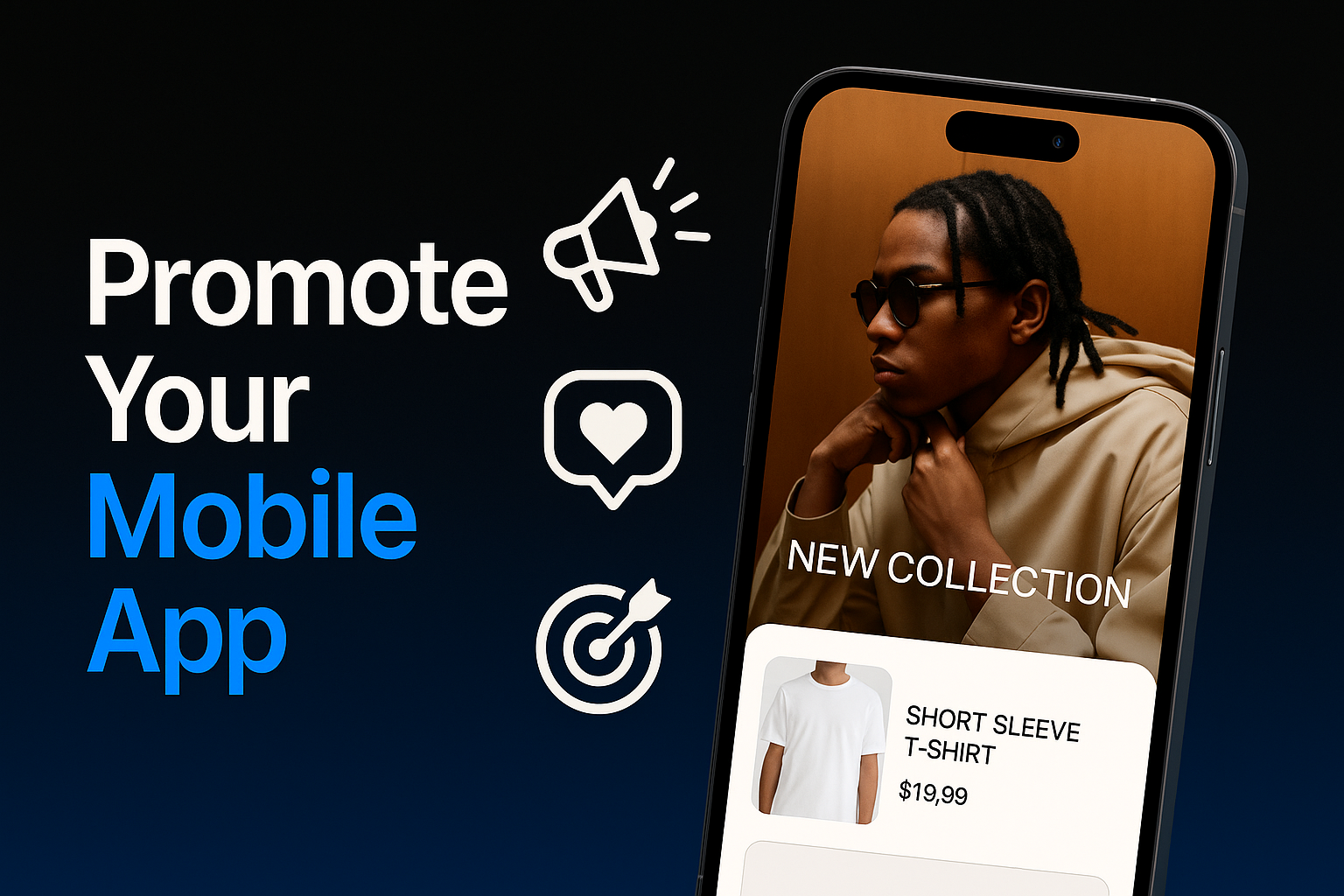8 Proven Strategies to Effectively Promote Your Mobile App
In today's competitive digital marketplace, creating a great mobile app is only half the battle. Without an effective promotion strategy, even the most innovative apps can struggle to gain traction. The app stores are crowded with millions of applications competing for attention, making visibility a significant challenge for developers and businesses.
Successful app promotion requires a multi-channel approach that reaches potential users where they spend their time and showcases your app's unique value proposition. From leveraging social media platforms to implementing targeted advertising campaigns, there are numerous strategies to help your app stand out from the crowd.
Before starting your promotion efforts, make sure your app has consistent branding - check our essential guide to mobile app branding to ensure your app stands out. If you're not sure whether your business needs a mobile app, review the 7 critical signals your e-commerce business should transition to a mobile app.

Let's explore eight effective strategies to promote your mobile app and drive downloads, engagement, and retention.
1. Optimize Your App Store Presence
Before focusing on external promotion channels, ensure your app store listing is fully optimized. App Store Optimization (ASO) is the foundation of successful app marketing.
Key elements to optimize include:
- App name and keywords: Include relevant keywords that potential users might search for
- Description: Clearly communicate your app's value proposition and features
- Screenshots and videos: Showcase your app's interface and functionality with high-quality visuals
- Reviews and ratings: Encourage satisfied users to leave positive reviews
An optimized app store presence not only helps users find your app through organic search but also improves conversion rates when they visit your listing from other promotional channels.
Pro tip: Regularly update your app store listing with new screenshots, feature highlights, and responses to user reviews to maintain relevance and demonstrate active development.
2. Leverage Social Media Platforms
Social media platforms offer powerful opportunities to promote your mobile app to targeted audiences. Each platform has unique characteristics and audience demographics that can be leveraged for different aspects of your promotion strategy.
Facebook
With its extensive user base and powerful targeting options, Facebook is ideal for both organic and paid app promotion:
- Create a dedicated page for your app to share updates, tips, and user testimonials
- Use Facebook Ads to target specific demographics most likely to be interested in your app
- Share engaging visual content that demonstrates your app's functionality
- Utilize Facebook Groups related to your app's niche to share valuable insights
Instagram
Visual-focused Instagram is perfect for showcasing your app's design and user experience:
- Post screenshots, short demo videos, and user testimonials
- Leverage Instagram Stories for behind-the-scenes content and quick tips
- Use relevant hashtags to increase discoverability
- Partner with influencers whose followers match your target audience
X (former Twitter)
X's real-time nature makes it ideal for announcements and community engagement:
- Share timely updates about new features and releases
- Engage with users who mention your app
- Create and participate in relevant hashtag conversations
- Use X Cards to drive app installs directly from tweets
LinkedIn
For B2B or professional apps, LinkedIn offers targeted access to business professionals:
- Share thought leadership content related to your app's industry
- Publish case studies demonstrating how your app solves business problems
- Engage with industry groups and discussions
- Use LinkedIn's advertising platform for highly targeted professional audience segments
Pro tip: Rather than spreading your efforts too thin, focus on the 2-3 social platforms where your target users are most active, and create platform-specific content strategies.
3. Implement Content Marketing
Content marketing helps establish your expertise, drive organic traffic, and create valuable resources that potential users will share.
Effective content marketing approaches for app promotion include:
- Blog posts: Create helpful articles related to your app's purpose and industry
- Video tutorials: Demonstrate how to use your app to solve specific problems
- Infographics: Share visual data about the problem your app solves
- Podcasts: Discuss industry trends and feature your app as a solution
Your content should focus on providing value rather than just promoting your app. By addressing your audience's pain points and questions, you position your app as a natural solution.
Pro tip: Repurpose your content across different formats and platforms to maximize reach while maintaining a consistent message about your app's benefits.
4. Utilize Email Marketing
Email marketing remains one of the most effective channels for app promotion, with higher engagement rates than many other methods.
Effective email marketing strategies include:
- Building a pre-launch email list to create anticipation
- Sending regular updates about new features and content
- Creating segmented campaigns based on user behavior
- Offering exclusive promotions to email subscribers
For existing users, email can be a powerful retention tool by highlighting features they haven't tried yet or suggesting new ways to use your app.
Pro tip: Personalize your emails based on user segments and behavior for significantly higher open and conversion rates.
5. Partner with Influencers
Influencer marketing can dramatically increase your app's visibility and credibility with targeted audiences.
When implementing an influencer strategy:
- Choose influencers whose audience aligns with your target users
- Focus on authentic partnerships rather than one-off promotions
- Provide influencers with unique content or features to share
- Consider micro-influencers for higher engagement rates at lower costs
Effective influencer partnerships go beyond simple promotions. Look for opportunities to collaborate on content that genuinely demonstrates your app's value to their audience.
Pro tip: Provide influencers with a unique tracking link or promo code to measure the performance of your partnerships and optimize future campaigns.
6. Run Targeted Ad Campaigns
While organic promotion is valuable, paid advertising allows you to reach specific audiences quickly and at scale.
Effective advertising channels for mobile apps include:
- App store ads: Display your app prominently in app store search results
- Social media ads: Target users based on demographics, interests, and behaviors
- Search engine marketing: Capture users actively looking for solutions your app provides
- Retargeting campaigns: Re-engage users who visited your website but didn't download your app
For maximum effectiveness, align your ad creative and messaging with the specific platform and audience you're targeting.
Pro tip: Start with small test budgets across multiple channels, then scale up investment in the channels that deliver the best cost per acquisition for your app.
7. Implement App Referral Programs
Word-of-mouth remains one of the most trusted forms of marketing. A structured referral program incentivizes your existing users to promote your app to their networks.
Elements of successful app referral programs include:
- Clear, compelling incentives for both the referrer and the new user
- Simple sharing mechanisms built directly into your app
- Tracking capabilities to properly attribute referrals
- Gamification elements to encourage multiple referrals
Pro tip: Test different incentive structures to find the optimal balance between referral cost and new user acquisition value.
8. Develop a Dedicated App Landing Page
A strategic approach often overlooked in mobile app promotion is creating a dedicated landing page on your existing website. This digital asset serves as a powerful conversion tool specifically designed to drive app installations.
A well-crafted app landing page provides several distinct advantages:
- Controlled Messaging Environment: Unlike app stores where you compete with countless other apps, your landing page gives you complete control over how you present your app's value proposition
- Search Engine Visibility: Increases your app's discoverability through organic search traffic, capturing potential users who may not be directly searching in app stores
- Conversion-Optimized Design: Can be specifically engineered to guide visitors toward the download action with minimal distractions
- Comprehensive Feature Showcase: Offers more space and flexibility to demonstrate your app's functionality than the limited format of app store listings
Your app landing page should include these key elements:
- A compelling headline that communicates your app's core value in seconds
- Visually appealing app screenshots and demo videos that showcase the user interface
- Clear articulation of key features and benefits, focusing on how they solve user problems
- Social proof elements such as user testimonials, ratings, and download numbers
- Multiple prominent download buttons linking directly to the appropriate app stores
- A FAQ section addressing common questions or potential objections
Pro tip: Include app QR codes on your landing page to simplify the download process for users already browsing on mobile devices. This eliminates friction by removing the need to search for your app in crowded app stores.
